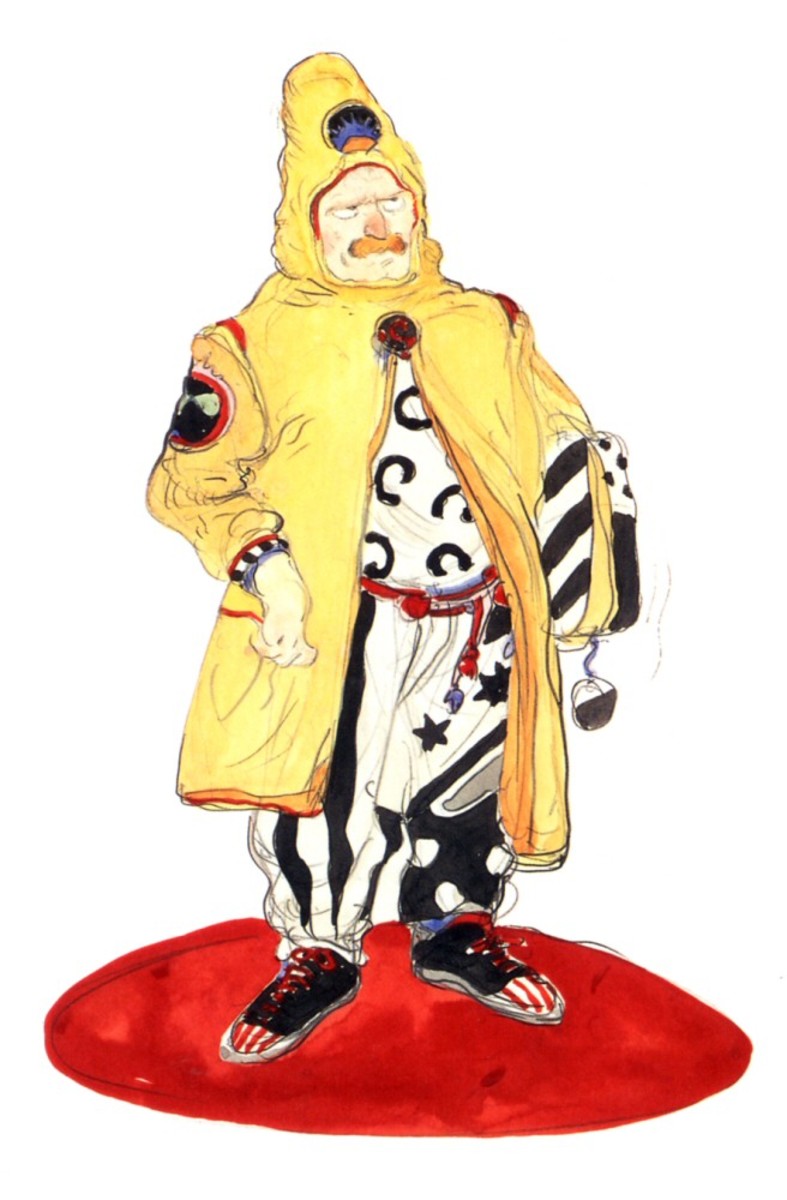- HubPages»
- Games, Toys, and Hobbies»
- Computer & Video Games»
- Roleplaying Video Games»
- Japanese Roleplaying Video Games
Review: Final Fantasy IV
Note: This is the fourth of a multi-part series featuring reviews of Final Fantasy games.
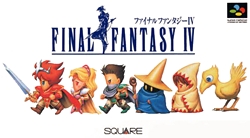
The Most Beloved Final Fantasy
The first Final Fantasy to be released for the Super Nintendo, Final Fantasy IV was also the second game in the series to be localized and released overseas. To avoid confusion at the time, the localized game's name was Final Fantasy II, which ironically now causes confusion nowadays amongst those who aren't aware that their beloved game from over 20 years ago was actually Final Fantasy IV.
I do mean "beloved game", its the most beloved game in the series, more so than even Final Fantasy VII (as VII has numerous detractors, something IV lacks at this point). Most people who've played it agree it's a great game, and those who played it when it came out often claim it as their Final Fantasy. Squaresoft is fully aware of this, and has since re-released the game on more platforms than any other Final Fantasy, including a 3D remake, and has even come up with not one, but two minor sequels for the game.
Still, I wonder about that, how much nostalgia plays a factor into those claims. True, there are a lot of factors that make Final Fantasy IV so memorable, in terms of actually playing through the game, however, there's a lot left to be desired.
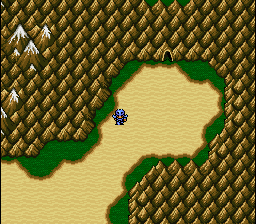
Final Fantasy IV: The Complete Collection (PSP) on Amazon
Final Fantasy IV: The Melodrama
Final Fantasy IV follows in the footsteps of Final Fantasy II, the real one, in that it focuses its efforts more on the narrative and its story more so than its gameplay. I'll get into the latter later, but Final Fantasy IV's story and characters easily eclipses the efforts found in Final Fantasy and Final Fantasy III, and the depth of both exceeds Final Fantasy II.
You play as the dark knight later turned paladin Cecil who realizes something isn't right with the kingdom he serves and he attempts to determine the true mastermind behind the scenes. Along the way, Cecil comes across several allies who come in and out of the party until the end when four other people finally settle into his party and the five-person team confronts the antagonists.
That sounds decent enough, but the game features a lot of odd twists that somewhat ruins the experience. Kain, in particular, is a frustrating character to watch as while most people like his "development" in this game, its annoying to see him keep leaving and returning to the party for the reasons explained in the game. Also, like Final Fantasy II, many characters end up sacrificing themselves to save Cecil and the rest of his current party (though, unlike Final Fantasy II, only one member actually dies this time around).
Final Fantasy IV's story also introduces a level of melodrama that simply did not exist in the three NES Final Fantasies. From the weird love triangle between Cecil, his love interest Rosa and the aforementioned flip-flopper Kain, to the party's constant remembrances of everyone sacrificing themselves, to the sadness-filled plot twist near the end, Final Fantasy IV turns up the drama several notches. A lot of people love this. I'm not one of those people.
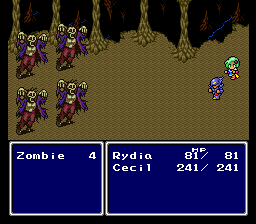
Back to Basics Battles
As for the aforementioned gameplay, Final Fantasy IV eschews the job systems featured in Final Fantasy and Final Fantasy III, nor does it try to innovate itself like Final Fantasy II. No, Final Fantasy IV goes the safe route, leaving nothing specifically creative in how characters level or develop.
Each character in the game is set to a specific class (Yang is a Monk, Kain is a Dragoon, etc.), with their own set of weapons and abilities. Like Final Fantasy I and Final Fantasy III, characters grow stronger simply by leveling up. For characters who learn spells, however, there is no specific way to learn or buy them, instead characters simply acquire spells once they hit a certain level.
In battles, Final Fantasy IV introduces the Active Time Battle system, a system that the series would use for five more games after this one. Each character has a timer bar (hidden in this game) that, when filled, allows them to act. Final Fantasy IV's ATB system, being the first of its kind, is somewhat archaic compared to the versions found in later games. In addition to not being able to see your party's ATB bars, you are forced to make a character act before getting the option to choose commands for a different character (later games would allow you to swap ready character's commands for more strategy).
Its this innovative battle system that, at the time, made Final Fantasy IV's battles unique compared to most other games, but that is no longer the case with many games, including the five other main line Final Fantasies employing similar battle systems.
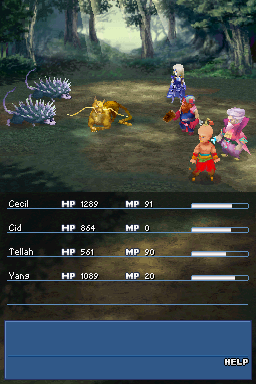
Difficulty Concerns
The original version of Final Fantasy IV was a pretty tough game, though not as tough as its predecessor Final Fantasy III if only because one could come across save spots in dungeons where they could fully heal and save their games. There was a perception at the time (which is probably still true today) that American gamers do not like difficult games. This perception is shown a few times back in the 80s and 90s, most notably the Super Mario Bros. 2 fiasco in which the original game was never localized, and instead a completely different, easier game was modified to include Mario characters and was released overseas as Super Mario 2.
Final Fantasy IV was no different. The game was modified for North American audiences to be much easier than the original Japanese game. Officially, the concern was that because North American gamers had no opportunity to play the difficult Final Fantasy II and Final Fantasy III, they would be unaccustomed to the difficulty found in Final Fantasy IV. Perhaps that's true, but perhaps they came to that conclusion due to the aforementioned perception of American gamers.
Later ports and re-released of Final Fantasy IV has somewhat varied in difficulty, but the DS version of Final Fantasy IV, a 3D remake, definitely restores the game's difficulty and then some. This remake also introduces a system that allows characters to learn abilities from other characters - a refreshing addition to the otherwise plain battle system.
Final Fantasy IV (DS) on Amazon
That Final Fantasy Look and Feel
Final Fantasy IV looks a lot like the earlier three games in the series, only with additional colors and details made possible by the Super Nintendo. Still, the sprites and effects sound and look like they have in the earlier games.
Final Fantasy IV also brings back several elements from earlier games, such as chocobos (including the storage unit known as the fat chocobo), a character named Cid (for the first time, fully playable, for awhile anyway), several summoner creatures that debuted in Final Fantasy III and, of course, the recognizable prelude, epilogue, and fanfare music themes.
Despite the emphasis on the dramatic plot, there is still a good sense of adventure in Final Fantasy IV throughout the entire game. Once the player gets a hold of a full-fledged airship, there still remains several islands and areas to explore, and the game still has an entire underworld and one extra area to explore at the game's end. That sense of adventure that makes Final Fantasy and Final Fantasy III so fun to play is definitely there in Final Fantasy IV, which does a lot to balance out all the melodrama the game features.
Where to Play Final Fantasy IV (Outside of Japan)
Name
| Platform
| Version
| Notes
|
|---|---|---|---|
Final Fantasy II
| SNES
| Original
| Named FFII because it was the second overseas FF release; also on Wii and Wii U's Virutal Console
|
Final Fantasy Chronicles
| PlayStation
| Original (w/minor tweaks)
| Compilation which includes Chrono Trigger - first instance of the game being called Final Fantasy IV overseas
|
Final Fantasy IV Advance
| Game Boy Advance
| Original (w/minor tweaks)
| Includes postgame dungeon and ability to play as non-endgame characters in endgame
|
Final Fantasy IV
| Nintendo DS
| 3D Remake
| Augment system allows characters to use command abilities of other characters
|
Final Fantasy IV: The Complete Collection
| PlayStation Portable
| Revamped 2D version
| New 2D graphics, includes the sequel The After Years and a new mid-quel: Interlude
|
Final Fantasy IV
| iOS/Android
| 3D Remake
| Similar to the DS version
|
Ratings
Rating
| |
|---|---|
Gameplay
| 2/5
|
Graphics (by respective standards)
| 3/5 (SNES), 3/5 (DS)
|
Audio
| 5/5
|
Plot
| 3/5
|
Replayability
| 1/5 (SNES), 3/5 (DS)
|
Challenge
| 2/5 (SNES), 4/5 (DS)
|
Conclusion
I know I seem harsh at times towards Final Fantasy IV, the beloved entry in the series by many, but I do feel it has become very overrated in recent years, especially as Squaresoft has come out with so many revisions and remakes of the game that no other Final Fantasy has received. Not being much of a story person myself, I found Final Fantasy IV to be a chore at times to sit through only because the dialogue was sometimes painful to read and the combat wasn't anything particularly special, either.
Even so, one can't dismiss Final Fantasy IV's place not just in Final Fantasy's history, but in RPG history. Its one of the first games to be this melodramatic, opening up a whole new realm of storytelling for the genre. Not too many games are as melodramatic as Final Fantasy IV was, though.
Regardless of the story, though, the world of Final Fantasy IV is still fun to explore and the characters are mostly likable and as I'm sure most people would like Final Fantasy IV's story the only real downturn is in the basic battle system, something the DS version even remedies.
So, basically, what I'm saying is Final Fantasy IV is a good game, and a solid entry in the series, but its in no way as great as people like to make it out to be.





